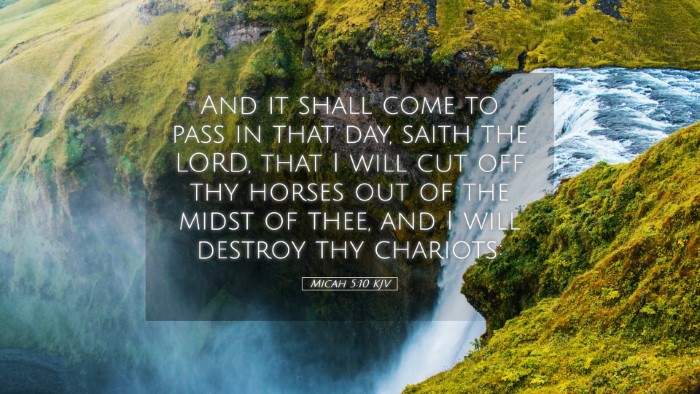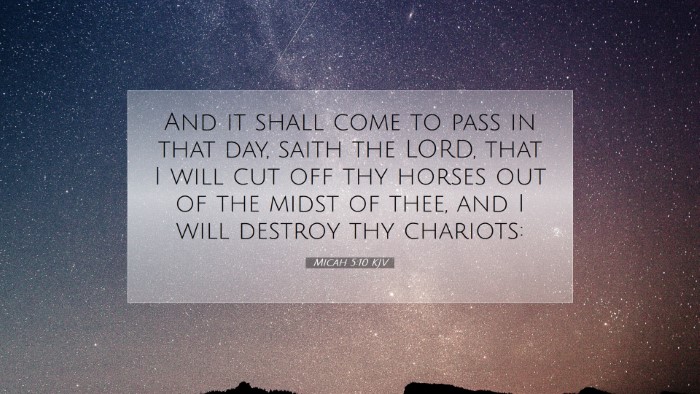Old Testament
Genesis Exodus Leviticus Numbers Deuteronomy Joshua Judges Ruth 1 Samuel 2 Samuel 1 Kings 2 Kings 1 Chronicles 2 Chronicles Ezra Nehemiah Esther Job Psalms Proverbs Ecclesiastes Song of Solomon Isaiah Jeremiah Lamentations Ezekiel Daniel Hosea Joel Amos Obadiah Jonah Micah Nahum Habakkuk Zephaniah Haggai Zechariah MalachiMicah 5:10
Micah 5:10 KJV
And it shall come to pass in that day, saith the LORD, that I will cut off thy horses out of the midst of thee, and I will destroy thy chariots:
Micah 5:10 Bible Commentary
Commentary on Micah 5:10
Verse: "And it shall come to pass in that day, saith the LORD, that I will cut off thy horses out of the midst of thee, and I will destroy thy chariots."
Introduction
The prophetic utterance of Micah 5:10 presents a significant moment in the narrative of Israel's prophetic literature. The verse encapsulates a promise of divine intervention accompanied by a divine judgment against Israel's reliance on military might.
This commentary synthesizes insights from public domain sources, seeking to deepen the understanding of its implications for contemporary faith and scholarship.
Contextual Overview
Micah delivers this prophecy within a tumultuous backdrop of social injustice and impending foreign threat. The broader context of the chapter presents a vision of hope through the promised ruler from Bethlehem, juxtaposed with the impending judgments on Israel's misguided strength.
- Theological Context: Micah's prophecies often highlight both judgment and restoration, reminding the Israelites of their covenant obligations and the consequences of their infidelity to God.
- Historical Context: The mention of horses and chariots serves as emblematic of power and militaristic strength prominent in ancient Israelite society.
Exegesis of Micah 5:10
The phrase "it shall come to pass in that day" indicates a prophetic future wherein God will take decisive action. This day of the Lord is a prominent theme in biblical prophecy, often signifying significant shifts in divine favor and restoration operations.
Significance of the Horses and Chariots
According to Matthew Henry, the cutting off of horses and destruction of chariots symbolizes a removal of strengths that the people rely upon instead of entrusting their safety to God. Albert Barnes echoes this sentiment, explaining that this action illustrates God's intention to humble the pride of Israel and redirect their faith from military resources toward divine providence.
Divine Judgment and Strength in Weakness
Adam Clarke elaborates on this judgment by emphasizing that God’s act of cutting off signifies both a removal of confusion and a clarification of divine sovereignty. This illustrates the paradoxical biblical truth that God's strength is often made perfect in human weakness, reminding believers of their ultimate dependence on Him.
Theological Reflections
This verse, along with its broader context, invites deep theological reflection regarding the nature of trust and reliance upon God. The stripping away of human resources and what is perceived as strength leads to a fuller reliance upon God’s provision and power.
- The Sovereignty of God: The text proclaims a strong theological assertion of God’s sovereign authority over nations. The removal of military might serves to remind both ancient Israel and contemporary readers that victory and security belong ultimately to God.
- Human Pride vs. Divine Dependence: Through this prophecy, there’s a poignant challenge presented to all believers to consider the ways in which pride in our securities detracts from our devotion to God.
Applications for Today
The contemporary church can learn valuable lessons from Micah 5:10 regarding reliance upon God rather than upon worldly means of security and strength.
- Question of Trust: Just as ancient Israel relied on chariots, modern believers may find themselves leaning on various cultural securities such as technology, wealth, or status. How might God be calling us to relinquish these?
- Emphasis on Prayer and Spiritual Warfare: As chariots are destroyed, so are physical means of conflict. This leads believers to focus more on spiritual weapons and prayer as primary tools of fulfillment of God's promise and kingdom work.
Concluding Thoughts
Micah 5:10 serves as a profound reminder of God's desire for His people to trust Him fully. In challenging times, when we may be tempted to rely on our understanding and resources, the call to surrender our “horses and chariots” to the Lord stands strong. This passage elicits a reflective response to acknowledge that true strength and deliverance come from the Lord, underscores the prophetic call for hope amidst judgment, and highlights the character of God who desires faithfulness from His people.


